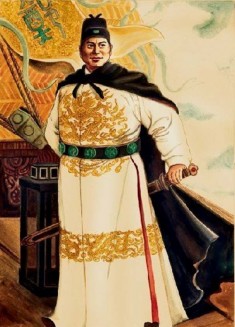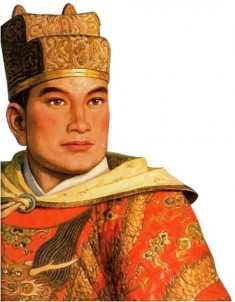| Zheng He | |
|---|---|
 |
|
| Fleet Admiral | |
| Specialty | Exploration |
| Born | 1371 Kunyang, Yunnan, China |
| Died | 1433 (around age 61–62) At sea |
| Nationality | Chinese |
Zheng He was an ethnically Muslim Chinese figure of the Ming Dynasty, which ruled China for 276 years between the 1368 and 1644. Zheng He might be called the “Christopher Columbus” of China because of his spectacular journeys to far-off lands, such as East Africa, the Middle East, and Sri Lanka. But he was also much more. He was a great military and naval commander, diplomat, adviser, emissary and political insider.
Rediscovering Zheng He
Zheng He was all but forgotten to Chinese history until his story was rediscovered and documented in a popular 1909 book by the Chinese scholar, Liang Qihao. Shortly after this incredible biography became widespread knowledge, a monument to the explorer placed in Sri Lanka was also rediscovered. It is known as the Trilingual Stele because written on the stone are homages to the Buddhist, Islamic, and Hindu religions in three different languages.
Zheng He’s Background
Zheng He belonged to a Muslim subgroup of Chinese culture known as the Hui people. He was born in 1371, the second son in a large family. His birth name was Ma He, and his father was Ma Hajji. Even though he was born into a Muslim family, his own religious convictions are uncertain.
It is likely that Zheng was a broad-minded intellectual whose contact with many cultures and belief systems gave him and expanded worldly view and perspective. He was honored and admired by Muslim, Buddhist, and Hindu alike.
Zheng He was born in a time of turmoil. When he was 10 years old, Ming forces had invaded Yunnan, the land of Zheng’s birth and family. Yunnan was controlled by the Mongols at the time. His father was killed fighting against the Ming army, although historical records differ on the actual circumstances and allegiance of Ma Hajji. He may have simply been killed in the complicated, chaotic violence of war between opposing forces.
Captured and Castrated
 At this time, young Zheng He was captured by Muslim forces allied with the Ming. He was subsequently castrated so that he could be placed in servitude to the Prince of Yan, who would become the future emperor, the Yongle Emperor. He eventually became a soldier in the Ming wars against the Mongols.
At this time, young Zheng He was captured by Muslim forces allied with the Ming. He was subsequently castrated so that he could be placed in servitude to the Prince of Yan, who would become the future emperor, the Yongle Emperor. He eventually became a soldier in the Ming wars against the Mongols.
He distinguished himself as a soldier and rose steadily through the ranks of the military hierarchy. This path led him to gain the personal confidence of the Prince of Yan. When the Prince rose to the supreme position of Emperor, Zheng also gained a position of considerable power.
In 1404, the Emperor appointed Zheng “Grand Director” of Palace Servants. It was a reward for his considerable achievements as a military leader in battles fought not only against enemies of the Ming Dynasty, but against the many internal feuding factions which characterized those complicated times.
Zheng He’s Sea Campaigns
Zheng He’s role in the Ming Dynasty evolved from that of soldier to a commander of ships. In 1424, he sailed to Palembang to confer an official seal upon and appoint an important official as a commissioner. Shortly after, the Yongle Emperor died and was succeeded by his son, the Hongxi Emperor. His new master wanted Zheng to serve as commander of the important city of Nanjing, and so his naval career was suspended for a time.
In 1430, the next ruler, the Xuande Emperor, ordered Zheng to lead an expedition to the “Western Ocean.” This was a time when China was moving aggressively to expand its trade and imperial power throughout the southeastern nations of Asia. The Ming Dynasty was also interested in expanding trade to distant locations in the West, which meant far-reaching efforts to establish links, trade, and power in Africa and the Middle East.
Legacy and Death of Zheng He
Similar to the way Europe began looking westward after the discovery of the New World by Columbus in 1492, the years of 1404 through the 1430s were a major age of seafaring expansion for China. The gigantic role Zheng He played in these expeditions cannot be overestimated.
His mind, skills, bravery, military instincts and superior diplomatic talents made Zheng He a natural to make significant gains for his country and to earn his place as one of the greatest explorers of all time. His accomplishments at sea included considerable military actions that expanded Chinese interests throughout Southeast Asia and among nations of the Indian Ocean.
Zheng He died at sea in 1433. His tomb remains today in the city of Nanjing. Numerous monuments to his memory can be found throughout the Asian world today.